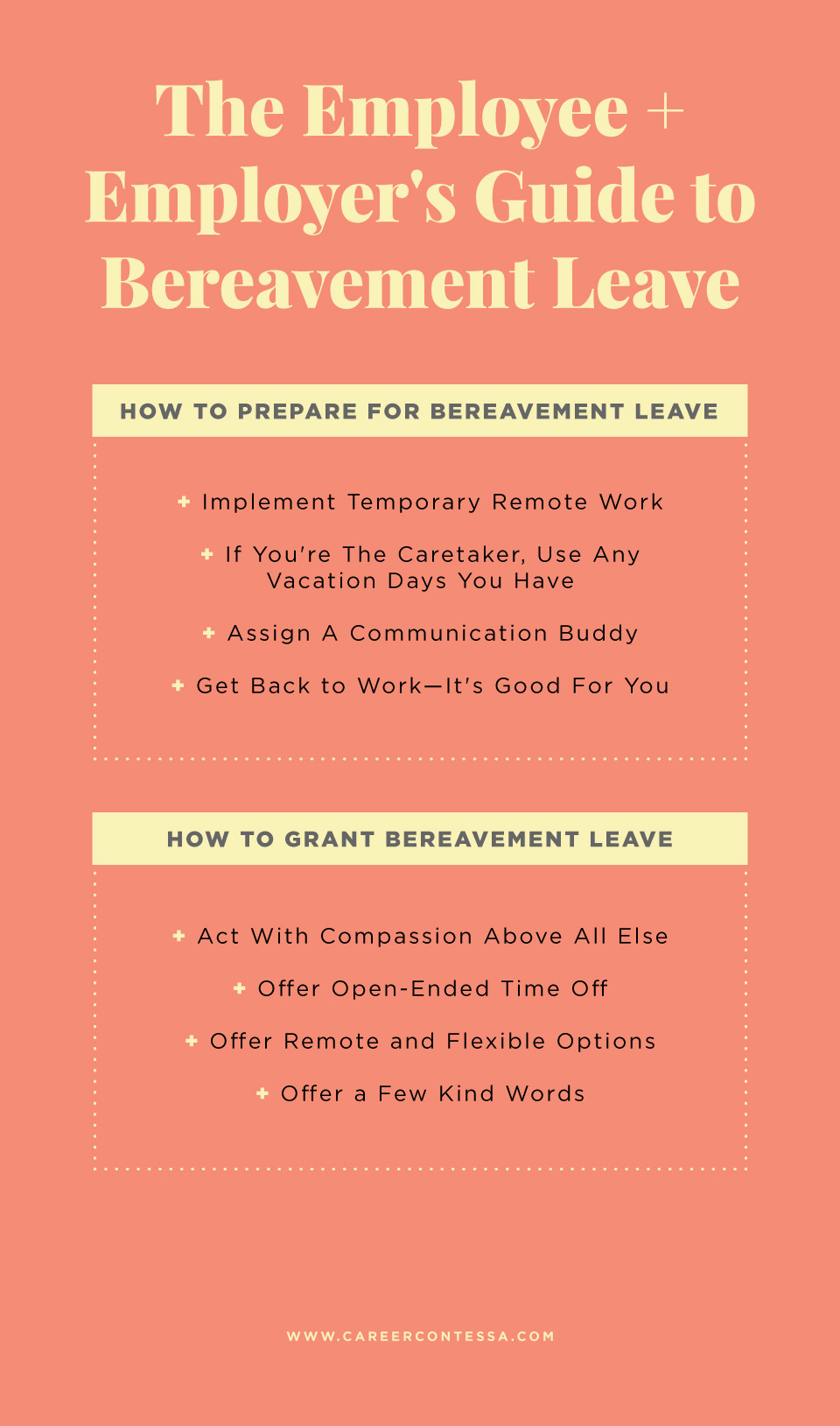I started writing this as an instructional piece about asking for bereavement leave—but it's really difficult to give "professional" advice on a subject like death.
Instead, I decided to share with you my personal story of taking bereavement leave. It sucked—It's not the time off you ever want to ask for—but I was lucky to have a supportive employer to give me the time and space I needed.
I didn't have to provide an obituary or remember to grab a funeral program before heading home from my father's funeral. Lucky me!
Every death is different. Sometimes people suffer for a long time. Other times, it's a horribly unexpected accident. Either way, it sucks. Even though we are all familiar with the phrase "death and taxes," we tend to put death aside until we absolutely have to deal with it. Dealing with the death of a loved one touches every aspect of your life—including your career.
Enter the wholly uncomfortable subject of bereavement leave. Bereavement leave is the time an employee takes off from work after a close family member dies.
Federal Employee Protections for Bereavement Leave
Believe it or not, there is no federal law in the United States that protects employees who need to take bereavement leave. The Fair Labor Standards Act (FLSA) does not require payment for time not worked, including attending a funeral.
As such, time off after a loved one passes away is something that is often worked out between employee and employer. According to a 2018 report on employee benefits from the Society for Human Resources Management (SHRM), 88% of businesses offer paid bereavement leave.
The Oregon Exception
Oregon is the only state with an official ruling on bereavement leave.
Oregon's Family Leave Act allows workers to take up to two weeks off for each family death. The leave must be taken within 60 days of the death and is only officially offered to employees working in organizations with 25 or more employees.
Just like grief itself, there is no exact science for approaching time off after a loved one dies. All we can do in these circumstances is provide as much clarity as we can—and hope that human decency provides the appropriate comfort for someone who is grieving a loved one.
California's AB 1949 Bereavement Leave
Up until recently, workers in California had no right to job-protected bereavement leave, but
AB 1949 creates protected bereavement leave under the California Government Code.
As of January 1, 2023, AB 1949 makes it unlawful for an employer to refuse to grant an eligible employee the opportunity to take up to five days of bereavement leave upon the death of a family member.
My Personal Bereavement Story
When I was 24 years old, working my first "real" job, my father fell ill with pancreatic cancer. From diagnosis to death, he ended up having three months.
Working While Waiting
"Luckily" for me, I was still living in New York City, close to where I grew up. My office was located a crosstown bus away from Memorial Sloan-Kettering, where he spent a few weeks. I was fortunate because I was not faced with the decision to fly elsewhere.
Often, when your loved one becomes ill, you are caught in a weird limbo.
Is this my last chance to see this person? Do I take time off work now to spend time with him? Do I save this time for after he passes away? Am I really about to lose this person, for real?
There is a constant push and pull. My best advice is to do what you think is best for you, right now. If you need to spend a week with your loved one, do it. You will never, ever regret this time. If your employer cannot understand your need for this time—well, it might be time to find a new employer.
My approach was to face it head-on and make a plan of action—for whatever came next. As soon as I knew what was happening, I notified my employer of the illness and how I thought it might affect my work. I laid out the work I needed to do and began to frontload my days. My coworkers were willing and able to take over if needed. Specifically, I over-communicated so that I could be where I needed to be—whenever the time came.
An Unexpected Death
Other times, death comes out of the blue. In these circumstances, work might actually be the very last thing on your mind.
Here are some other helpful tips for preparing for—and dealing with work—when a loved one has fallen ill or has passed away. Here's where the "policies" get really scary and depressing.
According to the Society for Human Resource Management, these are the typical averages for minimum unpaid bereavement leave that an employer must provide.
- Average bereavement for a spouse or child: 4 days
- Average bereavement for a domestic partner, foster child, grandchild, parent, sibling, or grandparent: 3 days
- Average bereavement for an extended family member or spouse's family member: 2 days
- Average bereavement for an opposite-sex partner: 2 days
- Average bereavement for same-sex-partner: 1 day
If these numbers make you furious, you're not alone. Unlike parental leave, which is much better outside of the United States, bereavement leave around the world is equally bleak. However, as we mentioned above, it is very common for an employer to extend human understanding when an employee suffers a loss.
Leave Related to Loss of Pregnancy
Since I first wrote this piece in 2019, there have been changes to how we speak about pregnancy loss and the very real trauma that comes with it—no matter how far along a pregnancy has progressed when the loss occurs.
Miscarriage occurs in about 25% of all pregnancies and it is the most common form of pregnancy loss. The physical needs of someone who experiences a miscarriage vary greatly. The physical effects can range from significant bleeding and cramping to procedures that might require hospital admission.
The mental and emotional effects are far-reaching and, as with any type of loss, impossible to quantify. As of April 2022, there are
35 states and four localities that provide protections for pregnant workers.
Only 13 states, 20 cities, and four counties have enacted laws that provide sick leave for workers who require medical attention, including care for the mental and physical repercussions of a miscarriage.
How to Take Bereavement Leave
Grief comes, often unannounced, and will likely turn your life on its side—for a little while, anyway.
When you’re interviewing for a job, you will likely be given an employee handbook to read and sign. It is very rare that an employer will include a section on bereavement leave. Generally, we like to avoid the topic of death, so that may very well play into this gap.
More often than not, employers are understanding in these circumstances. It is pretty standard that an employer will allow time off for care, funeral service, travels, and the grieving process in general.
There are, however, awful employers who might ask for proof or records of funeral arrangements when they receive a bereavement leave request. There are terrible bosses who won't consider a relative to be close enough to grant paid or unpaid leave.
There are ways, as an employee, to prepare for bereavement leave—whenever you may need to use it (and I hope you don’t have to).
Here's a sample template you could use to request bereavement leave in the event of an immediate family member's passing.
Dear [NAME],
I am writing to inform you that my [LOVED ONE] has passed away.
I would like to formally request three days of paid leave to travel to [CITY], arrange funeral plans, and take time with my family. Beyond that, I would like to use any unused paid vacation time I have accrued to spend this time with my family. I am deeply committed to the work I do at [COMPANY] and I trust that you understand.
I will be available via email during this time. For any urgent matters, I have notified [SUPERVISOR] of my absence and she is happy to help out in my absence.
Thank you in advance for your understanding.
Best,
[NAME]
How to Prepare for Bereavement Leave
Implement Temporary Remote Work
When a family member is ill or injured, you will want to notify work as soon as possible. As soon as my own father became ill, I had a very frank conversation with my boss. I knew things didn't look good.
I knew I would be back and forth from a hospital. I also knew that, when the time came, I might need a week to spend with my family. I was fortunate to have an understanding boss. She told me to take all the time that I needed.
If you don't live close to your loved one, create a case for working remotely. It's 2022, and remote work is accessible. If your loved one becomes ill, try to spend some time with her. Create a plan for remote work for a time period—whether it's a week or a month. In addition, it's painful, but it's best to make a week-long contingency plan when you need to take actual time off for funeral plans and, honestly, to take a break from everything.
Here is a sample email you could write to notify your employer of a sick family member and arrange temporary remote work.
Dear [NAME],
I am writing to inform you of the worsening state of my [LOVED ONE'S] health.
I would like to formally request three days of paid leave to visit and spend time with [LOVED ONE]. Beyond that, I would love to speak with you about an arrangement for me to work remotely from [CITY] during this time. I am deeply committed to the work I do at [COMPANY] and I trust that you understand this time is precious to my family and myself.
I will be available via email during this time.
Thank you in advance for your understanding.
Best,
[NAME]
If You're the Caretaker, Use Any Vacation Days You Have
When someone you care for—whether it be a spouse or a child—falls ill, the responsibilities will fall to you. While nurses are truly the most amazing people on the face of this planet, the main caretaker will want to be at the hospital or hospice, probably at all times.
In these cases, the
FMLA (Federal Medical Leave Act) can cover you in the event of an illness that requires your care. If a family member falls ill, contact your employer or HR representative as soon as possible to get your protections in order.
From here, you may want to take stock of whatever vacation time you may have accrued. If you feel comfortable, offer these days up to pad your own sick leave and/or bereavement leave. Chances are that most employers will be understanding and offer compassion. In fact, "
Compassionate Leave" is actually a thing. This is similar to bereavement leave, in that it offers paid or non-paid time off in order to care for and grieve a loved one. While not federally-mandated, compassionate leave is up to the discretion of the employer.
Assign a Communication Buddy
Another piece of advice I would give is this—get a communication buddy. Whether it's a close friend or a coworker, this is someone who will communicate on your behalf. When you have a gravely ill family member, people want to help. It's their nature. The only problem is that they usually don't know how to help. For better or worse, you are likely to be bombarded with texts, calls, emails, and so many casseroles.
Find a buddy to help you to communicate. When my father was ill, I created an email list for my two best friends to communicate everything. This way, I only had to write one email to communicate any news—whether it was progress, death, or funeral details. They took care of the rest—fielding and communicating messages of support, answering probing questions, and offering general support.
Get Back to Work—It's Good for You
It's important to grieve. It's so important to grieve. Grieving has no time period, though. Chances are, when you lose a loved one—whether a parent, a spouse, or a sibling—you will grieve them forever.
Take the time you need. Sit with your family, tell stories, cry, and laugh (seriously, share stories and laugh). After a little while, though, get back to real life. Work can be a huge distraction from grief.
Employers: How to Grant Bereavement Leave
As an employer, bereavement leave is arguably the toughest policy to implement and to adhere to. Unlike PTO, sick days, or vacation days, bereavement is not one size fits all. Losing a loved one is an event that causes lifelong impact—something a few days out of the office cannot possibly remedy. The first thing a proactive employer may do is enact a bereavement leave policy.
Typically, companies will provide three paid days of bereavement leave to a full-time employee. Most organizations are willing to allow an employee additional unpaid days so that the employee can appropriately grieve, travel if necessary, and get any affairs in order.
Act With Compassion Above All Else
Death will touch us all. As an employer, it is crucial to keep this in mind.
In cases like these, it is best for an employer to act on the laws of compassion, which are unlikely to be found in any employee handbook.
In the case of death, your employee is not likely trying to scam you for more days off. She's probably not going to the beach, day-tripping to Sonoma, or playing hooky. Instead, she is likely using this time to memorialize her lost family member and to plan a costly funeral.
Offer Open-Ended Time Off
Allow your employee to take the time she needs. Often, employees will appreciate this gesture so much that they will, in kind, be responsible with the time they need.
In fact, when I was in the middle of my own father's illness and death, I was looking forward to getting back to work—I was appreciative for the understanding from my boss and I wanted to repay the kindness by returning as soon as I wasn't a teary mess.
Offer Remote and Flexible Options
If your employee is ready to come back—maybe even a little too soon—offer her flexible work options. In the earlier stages of grief, some employees may use work as a coping mechanism or as a distraction. Make sure that your employee feels comfortable taking the time she needs to grieve.
By offering remote options or flexible options, your employee can ease back into work at her own pace—and feel comfortable doing so.
Offer a Few Kind Words
Death is something that will touch us all in our lifetime. Whether or not you have experienced a loss yourself, make sure your employee feels empowered to share feelings. While you don't have to be a full-time therapist along with all of your other responsibilities, a thoughtful email or a small gesture of kindness will go a long way.
If you are close with your employee, you might even consider attending a memorial service, dropping a lasagna at her house, or another small kindness. Contrary to popular belief, you don't have to move mountains in order to show compassion. Small gestures will go a long way.
If you or a loved one is suffering from grief,
you are not alone. Finding a local grief counseling group or speaking to someone who has experienced a similar loss can be extremely helpful. If you need help in your grief, visit
SAMHSA to find a grief counseling center close to you.











